Diabetic foot: paying the utmost attention
- Posted on 13/11/2023 19:21
- Film
- By abelozih@sante-education.tg

Extract from the article: The great danger of losing feeling in the feet due to neuropathy is that an injury can go undetected and become infected. For Dr Abdou Razak, Moukaila Internist and Diabetologist at Hôpital Sainte Joséphine (Lomé), the signs of a diabetic foot are ul
The
great danger of losing feeling in the feet due to neuropathy is that an injury
can go undetected and become infected. For Dr Abdou Razak, Moukaila Internist
and Diabetologist at Hôpital Sainte Joséphine (Lomé), the signs of a diabetic
foot are ulceration or destruction of the foot tissue, whether infected or not,
due to peripheral neuropathy.
Uncontrolled
type 2 diabetes, due to the toxicity of hyperglycaemia, will damage blood
vessels and affect the nerves that provide peripheral sensitivity. « Peripheral
neuropathy is a loss of feeling in the feet due to nerve damage. A reduction in
the natural hydration of the foot, leading to dryness, chapping and calluses,
and changes to the bones of the foot will also encourage the appearance of
pressure points which, against a backdrop of neuropathy, can lead to a foot
ulcer », explains Dr Abdou Razak, Moukaila Internist and Diabetologist
at Hôpital Sainte Joséphine (Lomé).
Amputation:
a consequence of the diabetic foot
The
diabetic foot brings together three conditions which are mutually exacerbating
if left untreated or neglected. « The first is ulceration, which often
occurs unbeknownst to the patient due to the reduction or loss of sensitivity
in the feet as a result of neuropathy; the second is impaired or even poor
blood circulation in the feet, which deprives the extremities of oxygen,
leading to poor wound healing; and the third is superinfection of the ulcer,
leading to neglect. Amputation becomes the inevitable sanction to preserve life
when the evolution leads to gangrene », informs Dr Abdou Razak,
Moukaila Internist and Diabetologist.
The
treatment of diabetes has evolved considerably over the years, and today's
medications enable diabetics to have better control of the disease, thus
putting off the spectre of amputations.
Taking
charge of your feet
Diabetics
must look after their feet like the apple of their eye, insists Dr Abdou Razak,
Moukaila Internist.Taking proper care of your feet gives you the chance to
avoid conditions that can lead to amputation. « It is recommended that
the feet of diabetics should be examined at least once a year by a doctor, or
several times a year in the case of neuropathy of the lower limbs. People with
diabetes should look at their feet every day, using a mirror or with the help
of another person, to get a good look at the sole of the foot and detect any
cuts, blisters, bruises, changes in colour, swelling or open wounds , » says the specialist. The
diabetologist insists that if there are already blood circulation problems or a
loss of feeling in the lower limbs, « you need to be even more
vigilant. At the slightest abnormality and as soon as possible, i.e. 48 to 72
hours, it is essential to consult your GP », he recommends.
Limiting
the risk of injury
Several
studies have shown that the majority of foot complications leading to
amputation are caused by minor injuries. To limit the risks, recommends Dr
Abdou Razak, Moukaila, take care to: wear suitable footwear, cut your nails
properly, avoid walking barefoot, and avoid getting your feet wet more than
they need to be.
Abel
OZIH




